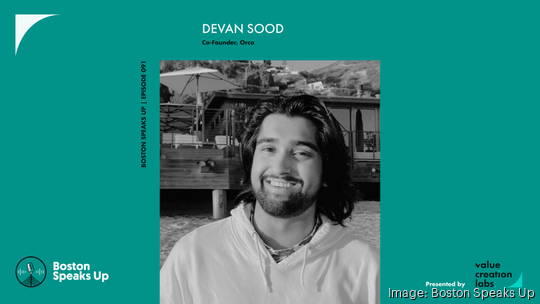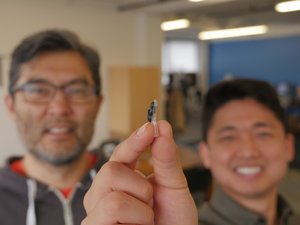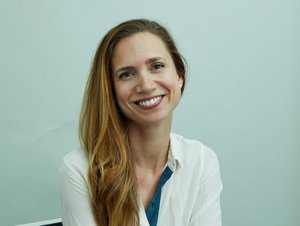
Devan Sood is the co-founder of Orca, a membership-based network of furnished month-to-month accommodations in destinations around the world. As working a 9-5 job increasingly no longer requires a long commute to a 5’ x 5’ cubicle, Orca is designed for digital nomads who travel freely and work remotely around the globe. A digital nomad himself, Sood is currently traveling the world helping inspire others to ditch their 12-month lease and live in a myriad of their dream destinations, without breaking the bank.
Sood grew up in Los Angeles and jumped into his first venture at the age of 14 when he started Unlimited Ltd. Clothing. In less than three years, Unlimited Ltd. was being sold in multiple countries, endorsed by top celebrities and working with charities across the globe.
Sood attended Babson College and graduated in less than three years. He then moved back to LA to launch a marketing consulting firm specializing in creative growth strategies to market to Millennials and Generation Z. That venture evolved into 96-LA, Sood’s growth agency focused on helping early-stage consumer-facing tech startups with product-led growth and acquisition experimentation.
With 96-LA still growing, Sood is leveraging his consulting skills to fuel the growth of Orca, while he travels the world living the experiences he is pitching to fellow digital nomads. We talk about all of this, Sood’s advocating for “teen-preneurship” and much more in this week’s episode.
You can listen to our podcast discussion embedded below or on any podcast platform you prefer (SoundCloud, Spotify, Apple Podcasts, Stitcher, and Google Play):
Before we get into the written Q&A, here’s a teaser clip from the episode:
Where did you grow up? And how would you describe your childhood?
I grew up right next to UCLA in a very privileged neighborhood of LA. We didn’t have a super nice or big house, my parents were never insanely wealthy, but I was extremely lucky to grow up in such an amazing place. I would describe my childhood, overall, as empowering. I was always taken care of, I never had to worry about food on the table, and that allowed me to focus on the other joys of life. I was always encouraged to explore my interests and live my life to the fullest, prioritizing experiences over things, and happiness over everything. I went to amazing schools, had independence and freedom, and had a support system that was always there for me. That being said, I went through some sh*t too. When I was 14, our house flooded while we were away, and it caused immense financial stress on my family. My parents ended up borrowing a ton of money from various sources to pay a construction contractor in full, who then disappeared with their money. We moved housing maybe 10 times in the next 18 months before we went back to live in our unfinished and under-construction house. It was hard, causing stress on everyone in my family individually.
If you could go back and give your 18-year-old self one piece of advice, what would it be?
I would probably say “chill out, timing is everything.” When I was 18, I was trying to do everything, everywhere, all at once — lots of unfocused hustling. I wasn’t thinking about what the greater market was ready for, I was thinking about all the problems I could solve and the future I could envision.
I would also emphasize that the path of being a founder is not linear. Lots of now-founders start their careers as a consultant, early-stage employee, working for Google, and/or as a domain expert of something specific. At 18, I thought working at Google would’ve been a distraction from building my own thing. Now I think being a “strategic founder” is underrated, i.e. working on the sidelines in a specific vertical until you land on something amazing to jump into.
What is the biggest challenge you had to overcome to get to where you are today?
Building a professional network that can vouch for my work ethic and the quality of my work took a long time because I had to produce a lot of great work. Unfortunately, I had no prior connections in tech, my parents aren’t venture capitalists, I didn’t grow up in Silicon Valley, and I didn’t go to Stanford. Not a whole lot of shortcuts for me to take, so I took the longer route. I’ve had to manually build my whole network of connections — most people in my network are intros from intros from intros. For example, I met Zach Servideo through Greg Gomer, who I met via Sarah at Pillar VC, who I met through Jamie at Pillar, who spoke in a VC class at Babson. How much time does that take to do 100x? A lot. And a lot of really solid output over a long duration is necessary for them to stick their neck out for me (should I ever ask for a favor).
Did you always want to run your own company? Why?
Honestly, no. It started with my mom. My mom is an entrepreneur. Actually, everyone in her family is — her parents, siblings, even extended family. After watching her when I was younger, I literally remember thinking that working for yourself was actually the norm. Even my first company was created accidentally — I had never set out to create a company, just create cool sh*t. I always liked tinkering and just thought it was a hobby until other people took notice and appreciated my taste. That being said, I fell in love with entrepreneurship as soon as I started my first thing. People using your thing, engaging with something you created from scratch — it’s addicting, and a lot of fun. That was when I was 15 though, so I guess it has been my whole life…
You didn’t stay in Boston long. What did you like/dislike about Babson College and the Boston startup scene?
There were a lot of things I did like about Babson and Boston in general, I’ll start by reassuring you of that. That being said, I have some beef. The first thing is that it’s just really hard to teach entrepreneurship. Teaching business is easy — business hasn’t changed in thousands of years, and even big-business cycles take 10-20 years to play out, so it’s predictable and teachable. Entrepreneurship is different, things are happening every day that change the game for entrepreneurs, and it’s really hard to teach. Babson does a pretty solid job at teaching the foundations of each vertical, to give someone an “entrepreneurial understanding,” but it’s not necessarily teaching how to build stuff.
Other context: I grew up in LA, the capital of consumer behavior (as far as I’m concerned). The reason the Boston business ecosystem didn’t resonate with me is because it’s not consumer-focused. From what I can tell, Boston and NYC businesses are more focused on numbers: fintech, biotech, insurance, payments, etc. I think that West Coast startups are more focused on consumer experiences: Hollywood, social media, marketplaces, consumer brands etc. For most of my time in Boston, I was super focused on building a social media app, and people in the Boston ecosystem did not vibe with that. Unfortunately I wasn’t smart enough to pivot my thinking to leverage my surroundings as much as possible, but it was a fundamental mismatch of ideologies.
What excites you the most about the future of the workplace?
For the first time in human history, a big (and quickly growing) portion of humans are making an income that is detached from their physical location. These people can go anywhere in the world and work from their laptop. It actually addresses more than you’d think: issues like housing cost, quality of life, work/life balance. The world is about to become the workplace, and it’s going to unlock our next evolution. Lot’s of positive externalities.
What are some of the biggest lessons you’ve learned starting your own companies?
It took me a while to really internalize a few concepts that people talk about every day: “think bigger,” “build something you can work on for 10 years,” etc. For the longest time, I didn’t really understand what it meant to think big. I would just see problems or opportunities and add my own flair to create a solution. I was a problem solver, I had yet to evolve into a visionary, and those are two different types of entrepreneurs. “Think big, then think bigger” may be something we should talk about!
Beyond that, there are a few attributes that entrepreneurs pick up along the way that are life lessons to some extent. A laughably-high tolerance for pain and failure, high perseverance, delusional optimism, the ability to sell, etc. — all of which I’d say I picked up pretty early on.
What are some of the biggest lessons you’ve learned helping founders build their companies?
Actually, the thing I’ve learned most when working with other founders is what not to do. Though it really helps me to see good founders in action, it’s helped me even more to see founders screw up and address the mistake. I’ve seen founders flop, make tough decisions to get through it and persevere, build toxic cultures, plateau — I’ve basically seen it all at this point. And having that context helps me make decisions going forward. Basically I’m just trying my hardest to not be a bad founder based on what I’ve learned.
What is the biggest challenge facing Orca?
There are a few big challenges. One we’re facing right now is finding renters at the right time when they’re ready to rent, which is typically only one, maybe three times per year, or we have to create such a strong brand/following that they remember us for multiple months and come back to us when they are ready. Easier said than done, especially with zero budget.
Where do you see Orca in five years?
Five years is too short a span to look at if you want me to say something that will excite you. In five years we might be the #1 housing platform for extended stays, overtaking Airbnb or coliving.com. But in 50 years, Orca will be the normal way to rent an apartment. Right now it’s hard to get a good rental: look at endless listings, scroll through a million photos, contact 100 property managers, try to negotiate a rate, commit to 12 months, pay 1-2 months-worth up front, move all the stuff you own from your current location, pay for additional furnishings, sign up for utilities, etc. and repeat every year. It sucks. Renting an apartment should be as easy, reliable, and flexible as booking your flight, and we’re building the infrastructure to be that company. We’ll have a network of thousands of units around the world which are all made for remote workers, we’ll have “tracks” so you can follow your interests, like Formula One, around the world, we’ll have a community of members in every destination that will feel like family to one another.
Let’s get deep for this one… If you could be remembered for one thing in life, what would it be?
I think I would want to be remembered for enabling amazing memories. Even my personal mission for Orca is about the memories. When I sat down for a month and did nothing but think about what I could work on for 10 years, there was one recurring pattern that kept resurfacing: culture. It’s true, I’m obsessed with culture. I love experiencing other cultures, I love helping people experience other cultures, etc. I’ve traveled all over the world, experienced many cultures, and I can confidently say I’m a better person because of it, with many happy memories I wouldn’t otherwise have. I created Orca with the intention of imposing that experience on others, to help people experience other cultures, to help people better understand themselves and their own community. If we all experienced more cultures and had a more open mind, I think we’d be a lot happier individually and as a society. I even think we’d have more appreciation for diversity, leading to us valuing diversity instead of just standardizing it.
We like the idea of ending our episodes with a challenge for the listeners/readers. Whether it be reaching out to an old friend, reading five pages a day from a book, creating a new healthy habit… What is one challenge you have for the listeners?
Go immerse yourself in a culture you’re not familiar with. Think about which of your friends is part of a community that you don’t know much about. Not really understanding your Chinese friend’s culture? Go get lunch in your local Chinatown together and talk about it, ask them questions. You’ll come away from it feeling even more interested, and probably make them feel good too. I personally love educating my friends on Indian and Hindu cultures, even on LA culture, and I think your friends will have a similar reaction.
###
Visit the Value Creation Labs blog for more inspiring stories; subscribe to VCL's 'The Curve' newsletter; and recommend Boston Speaks Up guests by contacting team@valuecreationlabs.co.








